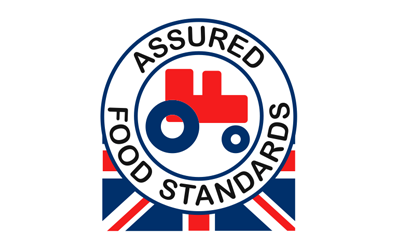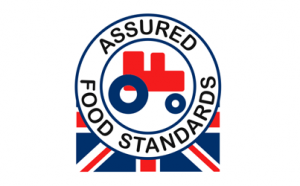“Farm assured standards” in the UK is, nowadays, marked with the Red Tractor, a scheme launched in 2000 by the National Farmer’s Union. The idea is simple enough: a kite mark for keeping rigorous standards, applicable to the whole of the UK food industry, split roughly into five groups:
- Farmers, meat processors, markets & transport
- Processors, packers, brands
- Wholesalers & distributors
- Food service
- Retailers.
Why choose Red Tractor? This is taken verbatim from the Red Tractor website:
Taking you behind the label, these are the values you can be sure of every time you buy a Red Tractor product.
1. Food Safety
Hygiene’s important at home, so why shouldn’t it be for farmers and food companies too? Our food safety standards ensure cleanliness and hygiene all the way from the farms to pack.2. Animal Welfare
When you choose Red Tractor, you’re choosing high animal welfare standards. Our veterinary and food industry experts are constantly refining these standards to promote the health and welfare of animals in farming.3. Protecting the Environment
Farmers look after around 75% of the land area of the UK, so their work can have a big impact on the landscape. Red Tractor standards include responsible farming methods, so when you’re buying Red Tractor food it means you’re playing a part too.4. Food origin
‘Food miles’ are a real concern for shoppers. The flag in the Red Tractor logo guarantees the food’s origin. The Union Flag provides an independently verified guarantee that the food you’re buying has been farmed, processed and packed in the UK.5. Rigorous standards
Our standards need to be meaningful and enforceable. That’s why over 78,000 farmers and 500 plus food packers and manufacturers working to Red Tractor standards are independently checked, verified and inspected.6. Traceability
Because Red Tractor covers every step of the food production chain, we can trace all Red Tractor products right back to their farms of origin.7. Independence and Integrity
Red Tractor Assurance (the body behind the Red Tractor logo), operates on a not-for-profit basis. Our independent chairman is supported by the most respected scientists, academics and industry professionals; such as vets, processors and animal welfare experts.
Note that this excludes egg production, covered by the “lion mark.” I’ve written before about eggs, so regular readers will know how I feel.
First thing to note is that Red Tractor is actually an amalgam of various accreditation schemes that preceded it, so there is not much new, other than the bright and shiny public image and logo. AFS, the body that runs the inspections and manages the Red Tractor branding, would claim to be improving standards through a variety of new initiatives, though as often as not these would have happened anyway. Does Red Tractor add any value? AFS would say it does, and to be fair the unification of standards has prevented multiple competing inspections and setting a consistent target. Does it simplify the process of management of standards? Probably does.
However, protecting standards in various ways and providing a PR onslaught has not prevented plenty of well-publicised occasions when it has failed to do so – for example, here and here. The standards could be argued to have lurched from crisis to crisis. Maybe there will always be those who fail to deliver base minimum standards, but the point of inspection regimes is to prevent that happening. Bear in mind also that not every producer is signed up to these standards – maybe with good reason.
I accept that minimum welfare standards are applied, but don’t think the optimum conditions are used as a benchmark. The one genuine benefit of the system is traceability, given that horse meat and other substances have found their way into our food chain and are not what is claimed on the label, but if we can be assured what the label claims is reasonably accurate that is just one benefit and no testament to the quality of the product.
In my opinion, there is one factor that condemns Red Tractor food assurance: does it mean either the quality of the finished product is better? I’d argue not. For produce grown, it’s mostly those varieties selected by supermarkets that rule the roost, some hailing from much further afield, often to the detriment of older British varieties with superior flavour.
Unlike the Soil Association standards, the Red Tractor does not imply produce is organically grown, nor does it mean that meat products are slowly matured for greater flavour, are genuinely free range, that meat is hung in the traditional way to offer the very best flavour? Nor does it prevent shortcuts or misleading use of language by supermarkets to suggest we are buying a top quality product when in fact it is mass produced, packed with artificial flavourings and well below the quality you have every right to expect.
Rather than aiming for mediocrity, why do we not have a foods standard body aiming for total excellence in the end product, as happens on the continent? There, you will recall, French and Italian farmers and small producers are protected to ensure they continue to make meats, cheeses, oils, breads, veg, wines, everything by traditional methods to the very highest possible standards. Surely this is what a foods standard kite mark should be about, not whether animals are kept to a base minimum legal standard, for example?
And if it were animal welfare standards we needed to measure, the RSPCA’s Freedom Food scheme offers a more rigorous baseline anyway – so why is this not the universal standard applied? The Red Tractor does not represent the best standard, so why does it claim to d0 so? Arguably it is an industry minimum standard which brings the lowest common denominator.
From the consumer’s point of view, this is highly confusing. You think you are buying excellence when in fact you’re buying something completely different – a product meeting the very lowest standards to which every manufacturer should be producing anyway. If it’s a label assuring you of food safety, it adds no value because your food should be safe anyway. To what standards are we aspiring here? If it were to produce food to the highest quality and flavour found anywhere in the world, there would be real value in the Red Tractor.
It greatly saddens me that that is not the case. I will continue to buy products based on my own assessment of what is best – and from suppliers who truly care about the quality of their goods, not whether it displays a red tractor.
PS. Just to illustrate the confusion over just what the terminology means and how it bamboozles consumers, this article on “outdoor reared” pork demonstrates just why you can’t be assured by standards set by Red Tractor or anyone else.
PPS. At least in the light of the horsemeat scandal, the red tractor standards with provenance have come to the forefront. That is the very very least we should be expecting.



![setheight250-vet-and-cows-in-field[1]](https://andyflavoured.co.uk/wp-content/uploads/2012/04/setheight250-vet-and-cows-in-field1-300x202.jpg)
